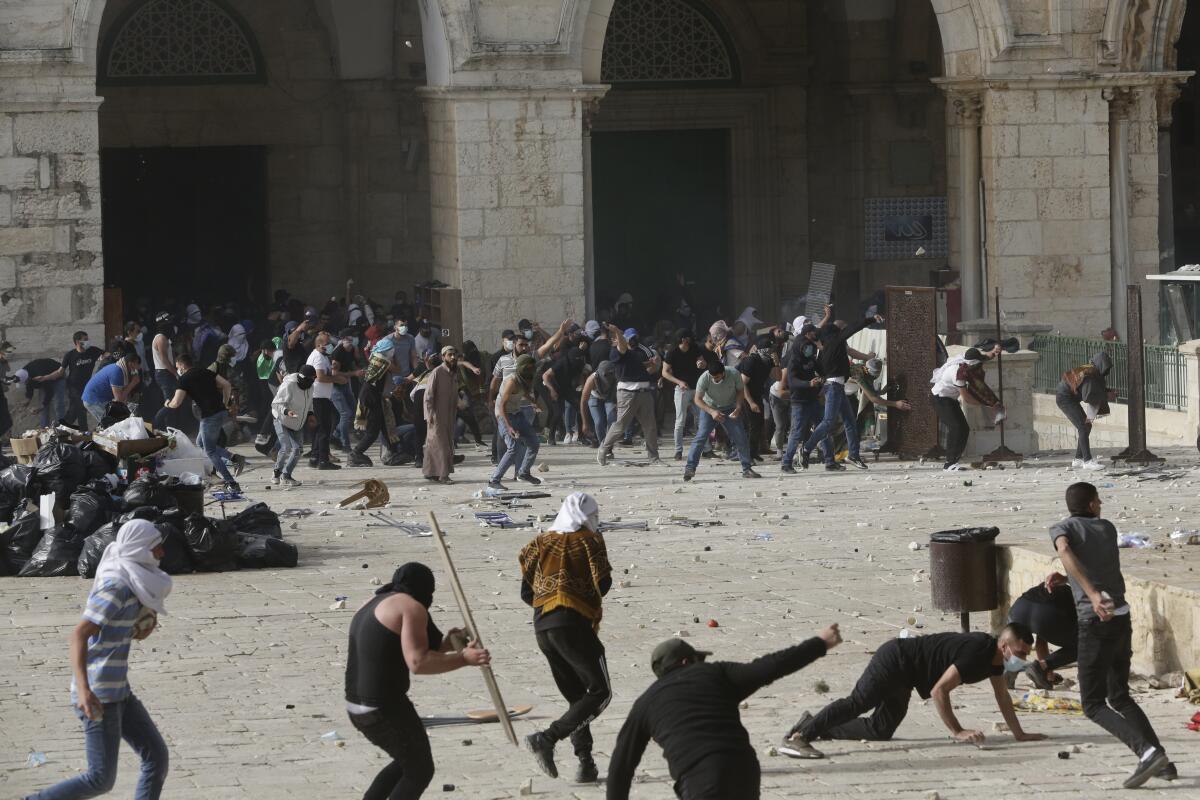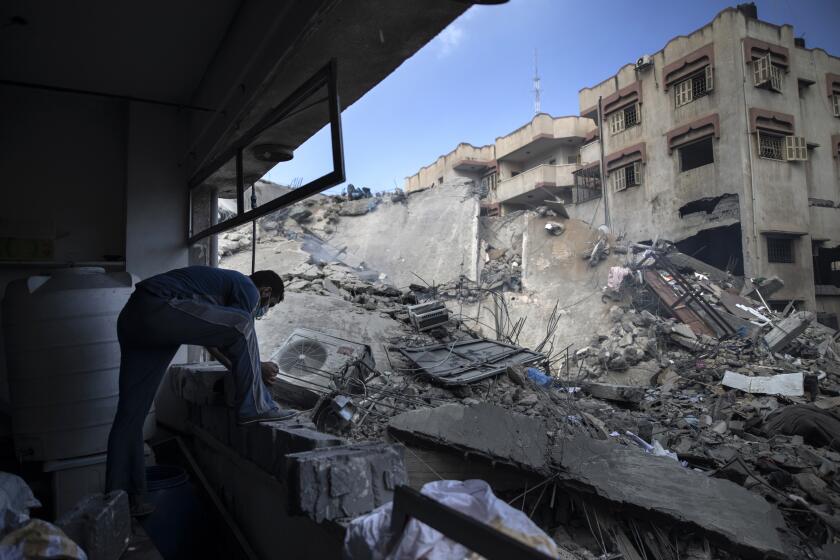Op-Ed: How the world could help end the Israeli-Palestinian conflict — and prevent future clashes

- Share via
Once again, Israel and Hamas are engaged in an intensive and deadly exchange of rockets and bombings. This latest conflict, with all its pain, highlights several deeper realities.
First, the Palestinian issue can be neither dismissed nor denied. Some in Israel may have believed that the Abraham Accords, which normalized relations between Israel and two Arab states, meant they could ignore the Palestinians and absorb the territories. But this week tells a different story — one that has implications not only for what is happening outside Israel but also internally for its social fabric.
Israel, of course, cannot solve the conflict on its own. Palestinians must also be willing to compromise, and that is something they continue to resist. But Israel must be open to new approaches that signal recognition of Palestinian, and not just Israeli, needs.
Second, Jerusalem remains the one issue that ignites passions and conflict, especially when religious sites are affected or Palestinian presence is threatened.
That is what set off the latest fighting between Israeli forces and Palestinian militants — the convergence of a pending decision by the Israeli Supreme Court that would evict several Palestinian families from the Sheikh Jarrah neighborhood and clashes that touched Jerusalem’s Al Aqsa Mosque, the third-holiest site in Islam.
In both instances — the narrow legal interpretation of who owns the land and the police response to Palestinian rock-throwing near the mosque — the Israelis may have felt their response was justified. But the issue so often in the Israeli-Palestinian conflict is not whether you are right but whether you are wise. And it was surely not wise for Israeli police to be firing into the Al Aqsa Mosque.
Third, Hamas is a threat to the future of Palestinians and any eventual hope for peace. Hamas is about rejection, not coexistence. True to form, its leaders were quick to try to claim the mantel of defense of Jerusalem and leadership of the Palestinian movement by launching rockets at Jerusalem. Its leaders knew this would change nothing in Jerusalem but would play on Palestinian anger even as it was sure to provoke a tough Israeli response.
That Palestinians in Jerusalem could be killed by Hamas rockets, and that Palestinians in Gaza were sure to die from the Israeli responses, mattered not in the least to Hamas leaders. They embed themselves underground and in tunnels they reserve for their weapons and fighters but not their public. The tens of thousands of rockets and the tunnels they have built consume steel, metal, electrical wiring, cement — all of which could be used for construction in impoverished Gaza, but they are not because that is not Hamas’ concern.
When the current battle is over, Gaza will be even more devastated, with overwhelming need for reconstruction, but Hamas’ first priority (with Iranian support) will be rebuilding its military arsenal so it can again attack Israeli cities.
Any future policy must ensure that Hamas cannot rebuild its arsenal, for sooner or later it will use it.
So what must be done now?
Past fighting between Israel and Hamas offers a window into current conflict — and how it could end
Start by relying on Egypt once again to mediate a cease-fire. Hamas is probably ready to end this latest round of fighting, knowing that electricity and fuel in Gaza are now in short supply and its longer-range rockets will sooner or later be exhausted.
Similarly, while Israel wants to reestablish deterrence, its military recognizes that it has succeeded in destroying much of Hamas’ rocket-producing capabilities and its network of tunnels. Moreover, Israeli leaders know they are approaching diminishing returns, given the limited payoffs of additional damage to Hamas capabilities and the price Israel pays internationally for the numbers of Palestinians being killed in Gaza.
Next, shine a spotlight on Hamas’ rockets. Do so by mobilizing a credible international plan for reconstruction, with specific large-scale infrastructure and housing plans, but conditioned on a verifiable withdrawal of all remaining rockets and their production capacity. Let Hamas explain before the international community and Palestinians why its rockets are more important than the people of Gaza.
And then, after calm has been restored, use the normalization process of Arab state outreach to Israel to break the stalemate between Israelis and Palestinians. The United Arab Emirates offered a model when it made full normalization with Israel conditional on Israel not annexing the territory in the West Bank allotted to it in President Trump’s 2020 peace plan — which would have permitted Israel to annex roughly 30% of the West Bank. The Biden administration should take the Emirates’ model and flexibly apply it.
For example, the White House should go discreetly to the Saudis and Israelis and propose a menu of normalizing options and responses: Saudi Arabia opens a commercial trade office in Tel Aviv and Israel stops settlement building to the east of the security barrier or on 92% of the West Bank. This would not produce two states but would preserve it as an option — and its possibility would be used to require and broker a parallel move toward Israel by the Palestinian Authority.
None of this will happen by itself. One thing we know: Returning to the state of affairs that existed before the latest outbreak is not the answer, unless, of course, we want the cycle to repeat at ever-heightening costs.
Dennis Ross served in senior national security positions in the Reagan, George H.W. Bush, Clinton and Obama administrations. He is counselor at the Washington Institute for Near East Policy.
More to Read
A cure for the common opinion
Get thought-provoking perspectives with our weekly newsletter.
You may occasionally receive promotional content from the Los Angeles Times.











